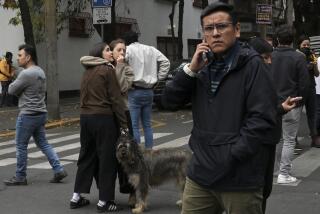As it recovers from earthquakes, Mexico City looks nervously at its (very) active volcano
- Share via
Reporting from Mexico City — While a jittery Mexico recuperates from a series of earthquakes, a steady stream of smoke emerging from the Popocatepetl volcano has been yet another reminder of the nation’s geological vulnerability.
Popocatepetl –“smoking mountain” in the Nahuatl language-- has been spewing steam and gases for several days, but authorities have said there is no imminent danger.
Early Wednesday, plumes of ash and superheated fragments emanated from the volcano, said Mexico’s disaster agency.
Authorities have said there is no link between the volcanic activity and the recent series of earthquakes in Mexico. Officials describe the activity as normal and not a cause for alarm.
The 7.1 magnitude quake that struck on Sept. 19, leaving more than 300 dead and thousands homeless, had its epicenter about 100 miles from Popocatepetl, which is widely known here as “Popo.”
Early Wednesday, Luis Felipe Puente, national coordinator of civil protection, sent a Twitter message noting that Popocatepetl had experienced overnight “explosions,” but adding that the activity had been anticipated in the current “yellow alert” phase. A yellow warning signals that people should be “alert and aware” of what authorities and the news media are saying about the volcano, Mexico’s disaster agency says.
Officials have not declared a “red alert,” which could involve evacuations of people living near the volcano. Popocatepetl is about 50 miles southeast of Mexico City. The volcano’s snow-streaked peak is visible from the capital on clear days.
In the last 24 hours, Popocatepetl has sent out “incandescent fragments” that were thrown more than 1,000 yards down the side of the volcano, Mexico’s National Center of Disaster Protection said in a statement on Wednesday. The volcano also emitted ash that drifted to the west, the agency said.
While clouds have obscured views of Popocatepetl, the agency said that authorities have observed a movement of steam and gases from the crater this week.
Officials warned that people should not approach the crater because of the danger of “ballistic fragments.”
Cecilia Sanchez of the Times’ Mexico City bureau contributed to this report.
twitter: @mcdneville
ALSO
2,000 historic buildings in Mexico damaged by earthquake
Amid Mexico’s quake chaos and rumors, a website helps people get facts straight
So many storms: After Harvey and Irma, can a thinly stretched FEMA come through for Puerto Rico?
More to Read
Sign up for Essential California
The most important California stories and recommendations in your inbox every morning.
You may occasionally receive promotional content from the Los Angeles Times.










